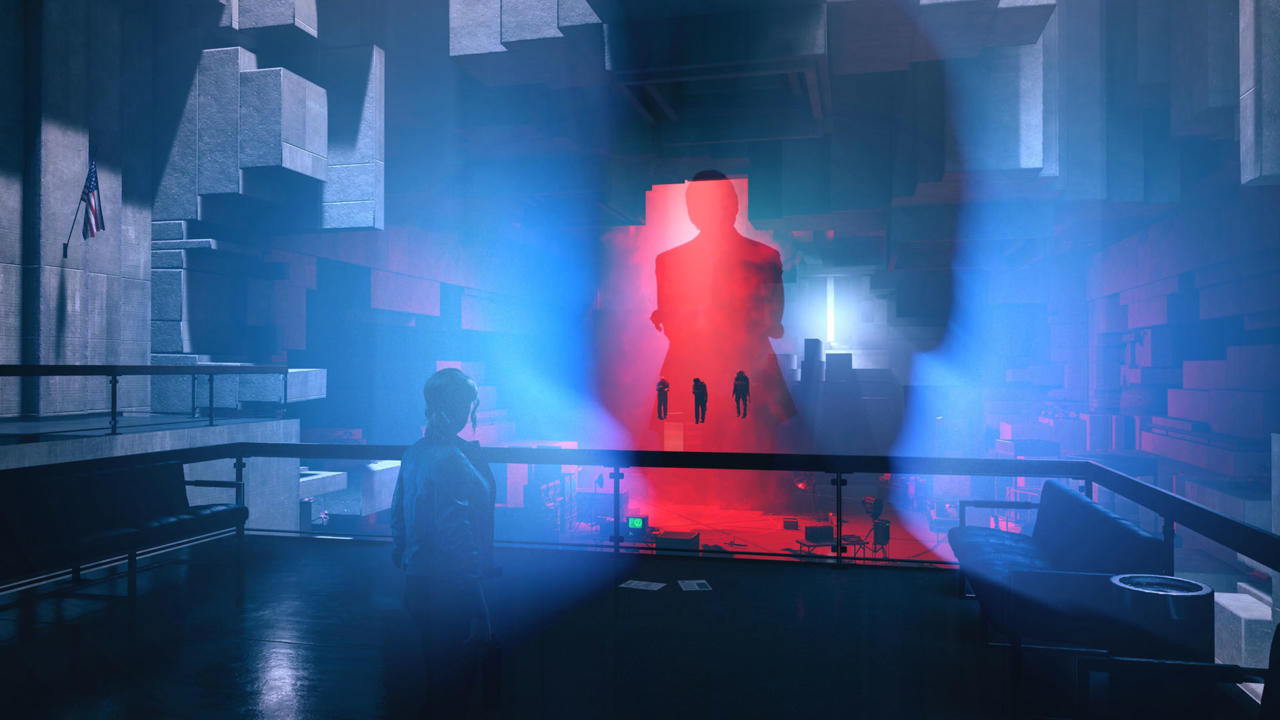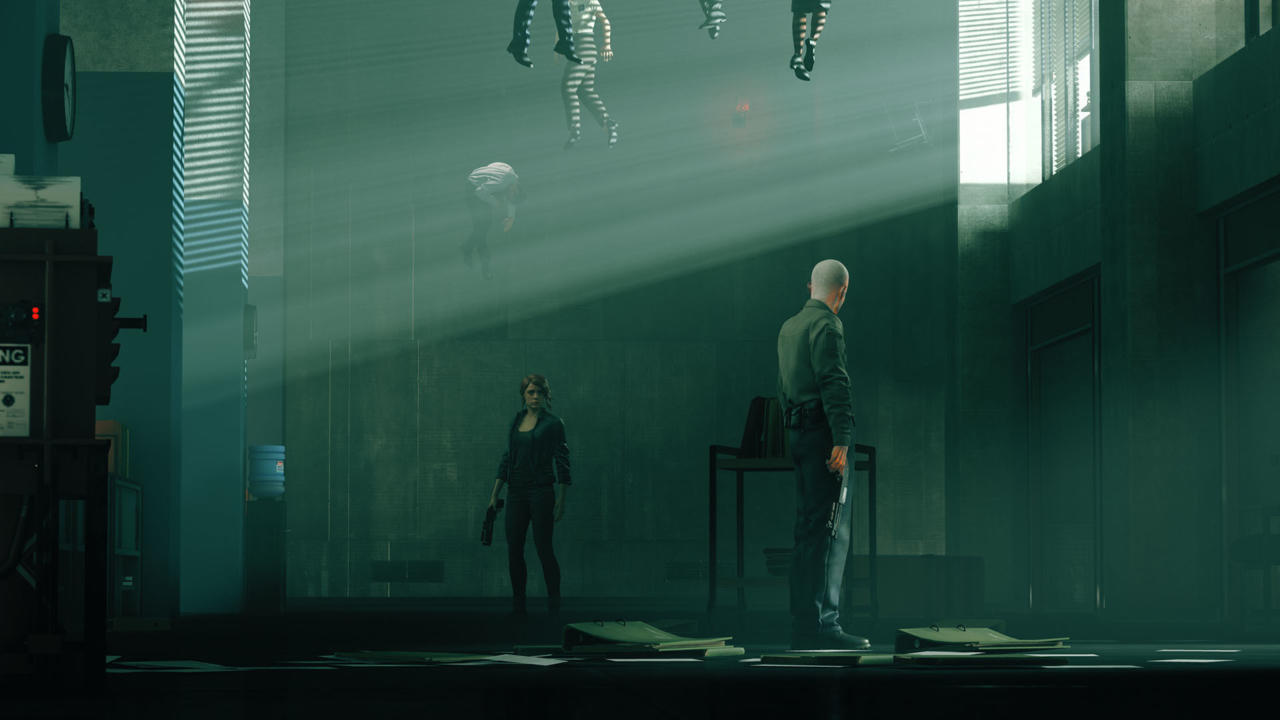One of the biggest surprises at E3 2018 was Remedy Entertainment's new PC, PS4, and Xbox One game, Control. Due to release next year, Remedy's latest project is an action-oriented game that focuses on environmental destructibility and supernatural powers, but it's the source of those powers and how they physically transform the game's setting that stood out the most. As discussed in an earlier article, the demo I saw was beautiful, haunting, and filled with strangely alluring touches that beg for explanation. During my interview with director Mikael Kasurinen, he compared Control's atmosphere to that of Annihilation, a book (and a Netflix film) that purposefully obscures cause-and-effect dynamics to keep you guessing.
Shortly after the demo, I also had the chance to speak with Sam Lake, the creative director at Remedy who's had a long and interesting career working on Max Payne, Alan Wake, and prior to Control, Quantum Break. I reviewed Quantum Break, and while I didn't fall in love with its story or the experimental TV-show structure, I did enjoy its combat mechanics and visual presentation. By all appearances, Control seems like an extension of the great work done in those two areas, but otherwise it seems like a very different beast. Given the opportunity to chat with Lake, I had to know: is there something fundamentally different about this project, and if so, what does that mean to him and the rest of the team? Like Kasurinen, Lake's answers didn't disappoint.
GameSpot: Judging by the demo I just saw, Control seems, in a positive way, unhinged. It doesn't seem like there are any creative barriers. Is that the case? How does that feel?
Lake: For this---and don't get this wrong because I'm really proud of what we achieved with Quantum Break--but intentionally from the beginning, with Quantum Break, we wanted mainstream appeal, a big blockbuster thing. Because, creatively, you want to keep things fresh and interesting and get excited about it. It's kind of a pendulum swing. And for [Control] we just said: 'You know what, let's just go with what excites us. Really, even if it's just really out there and weird, let's embrace it and go with it. We love pop culture, we love many different things, but so do gamers out there. Let's just trust that if we go on this journey that they'll come along.' And that excitement is contagious. So we didn't want to be boxed in in any way; we just wanted to go out there and go crazy, in some ways.
That was the starting point for this. Obviously inspiration always comes from many different directions, but one purposeful source of inspiration was the literary genre New Weird, which is kind of a subgenre of sci-fi in a way that deals with the unexplainable. Sometimes there are no answers, and sometimes we are dealing with forces that the human mind can't quite comprehend, or our modern science can't explain. We want to explore these kinds of ideas in [Control] and build a multi-layered, complex world. World building, as a starting point, was more important to us in this than in any previous game--create an interesting world that the players want to keep coming back to, want to explore, want to discover and piece together.
Once again, looking back to Quantum Break, it's a very linear experience. All of our games so far have been. We wanted to create a less linear experience, and you know, for a linear experience you kind of are holding the player's hand, like, "Come here, and this is the next thing and this is the next thing." Now it's hands off. We drop you in and you go and find what interests you. There is a story...and for the main character, a journey to find her place in this world. But at the same time there are many directions to go to and many discoveries to be made. You know, less hand-holding, less handing things to you on a platter; find it, search for it--what interests you--and you will be rewarded. Sometimes it's more challenging, but the funny thing that I feel with mystery and hidden things is that they drive you and motivate you. "There's something here, and I want to find out what it is." That kind of thing.

Could a player conceivably finish this game and not understand everything?
Yeah, I can see that happening, or, you have a theory and maybe you go online and you explain your theory and maybe there is someone else, who says, "[Well] I found these things, and my theory is this." People can debate about it, or somebody can say, "You didn't find this, go in and search for it and it will give you a slightly different picture."
But there is a predefined meaning in your head? I don't want you to say no if you don't want to, but…
It can't be random. I feel it's a good thing to resist the impulse to explain or over-explain everything. It's fine to leave things open for interpretation, but it can't be, "Yeah, anything goes" because then it loses its meaning. There has to be pieces [that fit] together.
What stood out to me was the notion of dream logic. Can you elaborate on how that drives the design of the world?
It can't be just convenient. There need to be rules underneath, and sometimes it can be slightly elusive or more emotion-based, which is where dream logic, I feel, is a good explanation for it. With this we were looking a lot into magical thinking, the primitive magical thinking where things are connected not by causality but by meaning. Somehow when it connects together it makes sense even though physics-wise, or what the science says, it shouldn't make sense. There is a sense of intuitive discovery in it, still. You know, archetypes and collective unconscious--these ideas are very much present in how the unexplainable and mystical works in this world.
Of course there's the action side of this game as well. You can see how some of the work done on Quantum Break translates to Control. How has it grown from there?
We tried to learn from every previous project, and a lot of ideas along the way, when working on one project...You come up with all kinds of ideas that maybe don't fit there, but feel like "this would be really cool to pursue." This project, all in all, and it might be funny to say it's much more player-driven because all games are, but coming from that very linear experience and making something non-linear, we purposefully wanted to go in gameplay-first. Gameplay is the focus of this one.
Yes, there is a story, but from that perspective we wanted to create a world and fiction that is very interwoven with the gameplay, and kind of enhances the gameplay and lifts the gameplay up, and frames the gameplay, and in some ways gives you [questions] like "why does it work this way?" But we wanted to create a deeper core action-gameplay system than we have done ever before. That goes into supernatural abilities that the player has and can unlock and discover in the world.

You saw Jesse had the mystical gun, and the idea there is that the Federal Bureau of Control looks for unexplainable phenomena. They go in and investigate and try to contain and control it. Sometimes they discover things that have been mystically altered, and the most powerful things they call "objects of power." You know, things that have been changed in some mysterious way. The gun that Jesse has is one. It's an ancient service weapon, and at the same time it's the Director's gun. We have, with the gun, the idea of a modern take on [the] King Arthur legend: whoever picks up this gun and is deemed worthy through a trial becomes the Director of this bureau. Jesse doesn't understand it, and the player early on doesn't really understand what's going on. But with that thing comes responsibility and power.
You can find different forms for this gun. It can do many things. You have supernatural abilities, your gun and different gun forms, and we are using our proprietary engine, Northlight, and we are pushing now the concept of dynamic destruction and physics as far as we can possibly go. The environment is a big part of the whole action gameplay thing because you are breaking your environment and then using all of the debris, because many of the abilities you have in one way or another deal with physics or telekinesis and things like that. You can use the environment as a tool and as a weapon against the enemies, and they have similar powers as well. At times, it goes to unexpected places and goes relatively crazy. We had this idea that we wanted to create...that the action part of it should be sandbox-y. There are many systems going on at the same time.
How technically difficult is it to piece that all together?
I'm not a tech guy; I'm always baffled and impressed. Clearly, as tech goes forward...that makes making games for me so interesting. Every single project, we can do something we couldn't have even considered before. And now we are focusing on these aspects and yeah, you can do pretty impressive things with it.
What are you most proud of with this project?
I tend to be a person who approaches these things from a story angle and from the perspective of mood. I think that we have a really strong identity when it comes to themes and tone and you know how the experience feels. It's a combination of story aspects and visuals and audio, all of these things coming together...To me it feels very unique. That was, and always is, our goal: to do our own thing, to do something that hasn't been seen before.
Nancy Drew: Mystery of the Seven Keys | World Premiere Official Trailer Modern Warfare III & Warzone - Official Cheech & Chong Bundle Gameplay Trailer The Fallout TV Show's Biggest Easter Eggs Teenage Mutant Ninja Turtles: Splintered Fate – Announcement Gameplay Trailer Dead Island 2 – Official SoLA Expansion Gameplay Launch Trailer Little Kitty, Big City – Release Date Reveal Harold Halibut GameSpot Video Review SteamWorld Heist II – Official Reveal Gameplay Trailer Cat Quest III - Release Date Trailer LORELEI AND THE LASER EYES | Release Date Trailer Honkai: Star Rail — "Non-Zero-Sum Game" | A Moment Among the Stars Animated Trailer Stellar Blade - Official Live Action Release Date Trailer| PS5
Please enter your date of birth to view this video
By clicking 'enter', you agree to GameSpot's
Terms of Use and Privacy Policy
Who are some of the other major contributors at Remedy working on Control?
We came up with the concept and the world, the idea for this game, together with Mikael Kasurinen, who is our game director. He really is in charge of the project. With Mikael, we have been working together since Max Payne 2.
It's great; it's a team effort. There are so many important figures on the team like...the whole brutalist architecture and world building is Stuart Macdonald. One of our art directors, Janne Pulkkinen, is the technical art director, so all of the crazy visual effects and all of that comes from his brain and is realized. Anna Megill is the narrative lead now. I was concepting the story and the characters and then when we went into production I handed it to her and the narrative team. This is always a tricky thing because you don't want to leave anyone out, but I feel we have a lot of incredibly talented people.

